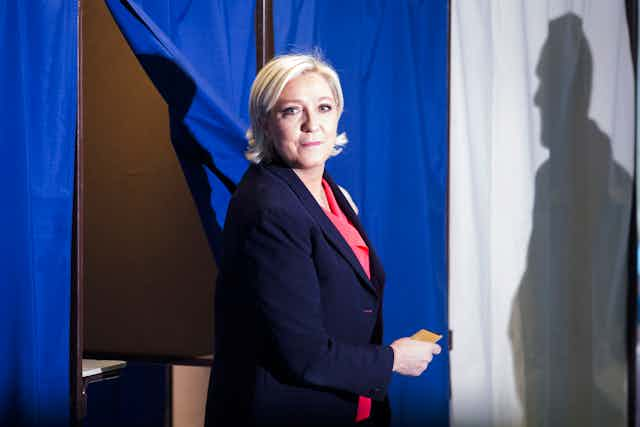It’s often said that there are no prizes for coming second. Yet in many ways coming in as the runner up in France’s 2017 presidential election is an opportunity for the Le Pens and the Front National.
Beaten convincingly by centrist candidate Emmanuel Macron in the second round of voting, Marine Le Pen might have been expected to appear downbeat. But lessons can be learned and strategies developed for the next presidential contest in 2022.
Le Pen’s campaign in 2017 was less than impressive. Unimaginative compared with Jean-Luc Mélenchon’s innovative use of holograms, she repeated much of her programme from the 2012 presidential elections and relied heavily on the traditional pitstops of a presidential campaign: petting animals and bringing croissants to (on this occasion striking) workers.
Even when it came to Le Pen’s use of social media, her campaign team repeated their tactics of 2012, reiterating core messages from Le Pen’s speeches and allowing the odd personal message from the candidate herself. It was a far cry from Donald Trump’s use of online platforms to connect with voters.
Old themes are the best
Ironically for a candidate who has sought to tone down the extremist image of her party and to appear more presidential, Le Pen came into her own when her carefully-managed image began to slip.
This was particularly clear when in a radio interview she pointed, unprompted, to the French education system’s teaching of the occupation of France in World War II as an example of French pride being dented. Le Pen claimed that those responsible for deportations of Jews during the occupation did not represent France. Echoing the myth established by Charles de Gaulle that all of France resisted and the Vichy regime was not legitimate, she argued that children should be taught that the Nazis were behind the infamous Rafle du Vel d’hiv round-ups. This was despite historical evidence that Prime Minister Pierre Laval and the head of police, René Bousquet, were just as complicit as the Nazi authorities. Le Pen spoke with authority on the issue in a way that did not come across when discussing the economy.

Le Pen also thrived during the period just before the first round, after the killing of policeman Xavier Jugelé in central Paris on April 21. Linking immigration and criminal activity has always been a mainstay of the Front National, and Le Pen jumped on the chance to point to the French state’s failure to tackle radical Islam in the banlieues of major cities. This was also a key theme of her campaign before the second-round vote, addressing venues in Nice and Paris with promises to deport immigrants suspected of radical activity.
Yet Le Pen slipped up badly in the head-to-head debate with Macron. Instead of proposing concrete solutions to the problems of the the suburbs, she lifted rhetoric straight out of Nicolas Sarkozy’s playbook, pointing to “thugs” and “vandals” living in housing estates. This might not have turned off existing supporters but for the undecided voter, the absence of solutions will have appeared resolutely unpresidential.
Mixed messages
Le Pen’s campaign was one of mixed messages. She sought distance from the extremist reputation of the Front National but was consistently most energised when on home turf discussing immigration, terrorism and France’s past.
The policy of “dédiabolisation” (detoxifying the party after the Jean-Marie Le Pen years) has thus had two very different consequences. In making the Front National appear more acceptable, many of the party’s old themes, like immigration, have themselves become more mainstream. So while Le Pen’s success in the first round did not come as a shock, Marine appeared torn in the 2017 campaign between where she feels most comfortable – when talking of putting “France first” or when seeking to present a more refined presidential image.

Despite her loss, all this adds to the experience of Le Pen, her campaign team and the wider party. In a future debate, she will know to avoid entering into a slanging match with her opponent and to focus on concrete policies which tie into traditional Front National themes. At the same time, an energised Le Pen is a convincing Le Pen. Since her temporary resignation of the leadership seems to have made little impact as an electoral tactic, a future Front National candidate may as well continue to embrace the party and its members.
There are many battles to come: from the 2019 European elections to the 2020 French regional elections, in which the Front National stands a good chance of success. The party can, and will, finesse its tactics before the next presidential campaign in 2022.
Marine Le Pen has done much to boost the chances of the Front National, taking the party very nearly to the Elysée this time around. Yet some within the party may well have decided that it was Marine, not the Front National’s membership or its past, who let slip the chance to win the ultimate prize.
Lurking behind Marine is her niece, the intelligent, amiable, devoutly Catholic Marion Maréchal-Le Pen. As the party implements the lessons of the failed 2017 campaign, Marion will remain prominent in the Front National’s electioneering. All is by no means lost for the Front National, but if Marine fails again in 2022 then it may well prove to be au revoir Marine and bonjour Marion.

